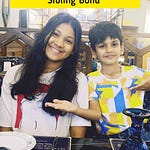Dear Joyful Parent,
Let me tell you a story that sounds like it’s straight out of folklore—but it’s grounded in psychology and science.
A group of prisoners, blindfolded, were told they were about to be bitten by a venomous snake as punishment. No real snake was used. Instead, researchers pricked their skin with two needles, exactly where the snake’s fangs would land.
And yet, many of these men reacted as if they’d been poisoned: rapid heartbeats, sweating, numbness. In some versions of this chilling experiment, even death occurred.
Why?
Because the mind believed it.
This wasn’t imagination. It was biology responding to belief.
This is what scientists call the Placebo Effect. And it has a darker twin: the Nocebo Effect.
Walter Kennedy and the Biology of Expectation
In 1961, psychologist Walter Kennedy coined the term nocebo (Latin: "I shall harm") to describe how negative expectations can cause real physical symptoms—even in the absence of any harmful substance.
Headaches. Stomach pain. Fatigue. Dizziness. Nausea.
Not from poison, but from expectation.
And the opposite? The Placebo Effect ("I shall please") — when positive belief leads to healing.
Kennedy taught us this: It's not just the medicine that matters. It's what the mind believes about it.
So What Does This Mean for Us as Parents?
Our words, like medicine, carry power.
When we say:
“You're always behind.”
“This is going to hurt.”
“You’re not good at this.”
...we aren't just describing something. We're planting beliefs.
Beliefs that a child’s body may respond to with real anxiety, resistance, or even physical discomfort.
But here’s the gift:
We can flip the script.
When we say:
“You’re safe.”
“I trust your body.”
“You’re learning.”
...we are activating their inner placebo: the belief in safety, strength, and growth.
This Isn’t Just Woo-Woo. It’s Neurobiology.
Researcher Fabrizio Benedetti found that when patients were told to expect pain, their brains released chemicals that actually increased pain.
But when they were told they were safe or healing, their brain produced natural opioids and dopamine.
It’s not imagination. It’s the mind-body connection. And children feel it even more intensely.
A Joyful Practice for the Week:
✅ Notice the next time you’re about to warn your child of failure, danger, or discomfort. Pause.
✅ Ask yourself: "Is this belief helpful? Or is it a nocebo?"
✅ Replace it with something grounding and true:
“You can do this.”
“I’m right here.”
“Let’s try together.”
The world will give our children enough reasons to doubt. Let’s be the ones who remind them to believe.
P.S. Ever noticed how a doctor saying “this will hurt” or a teacher commenting “you always mess up under pressure” can instantly shift a child’s body and mood?
When Institutions Plant Fear—And How You Can Be the Antidote
It happens in moments so ordinary, we often miss them:
🩺 A doctor says, “This will hurt a little.”
🧑🏽🏫 A teacher mutters, “You always panic before exams.”
📋 A school report reads, “Your child is lagging behind their peers.”
No harm intended. No cruelty meant.
But each of these phrases is a nocebo seed—a subtle script that tells a child:
Something is wrong with you. Prepare to struggle.
According to psychologist Walter Kennedy, this is where the nocebo effect begins—not with a drug or diagnosis, but with expectation.
And when those expectations come from authority figures—doctors, teachers, specialists—they carry even more weight.
So What Can You Do as a Parent?
You can’t always control what others say to your child.
But you can be their buffer, their translator, and their anchor of calm.
Here’s how:
✅ Reframe after appointments or school meetings:
“Yes, the doctor said it might sting, but our bodies are smart and yours is so strong.”
✅ Speak to their nervous system, not just their mind:
“Even if you’re scared, I’m right here. We’ll breathe through it together.”
✅ Counter fear-based labels with trust-based truths:
“They may see struggle. I see growth. And I trust your pace.”
✅ Be the calm after the storm:
After a tough school day or anxious appointment, don't rush to fix.
First, anchor. Hold. Reflect:
“That was a lot. What did your heart feel? I’m listening.”
Because even in a world full of loud, rushed, evaluative language—your child deserves one space where they are believed in. Let that space be your voice. Let it be your home.
Until then, speak as if your child’s body is listening.
Because it is.
With warmth and wonder,
Swati
Founder, Joyful Parenting Club
Author of "Give Your Child Wings" The Ultimate Parenting Guide
Reserve your spot for the Live Parenting Masterclass and get the opportunity to become a Parenting Coach. Certification and Life Time Membership are also available.
Join my Free live Masterclass to know more.
Get my Book on Parenting, “Give Your Child Wings” The Ultimate Parenting Guide
You can connect with me and access to my videos on:
✨ YouTube
✨ Website
✨ Joyful Parenting App: (For Android Users)
✨Joyful Parenting App: (For IOS Users)
Thank you for reading! Don’t forget to like, share, and subscribe! 😊













Share this post